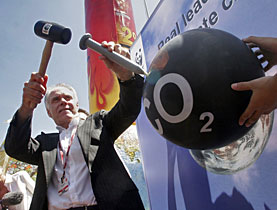Swiss satisfied over Bali climate deal

Swiss Environment Minister Moritz Leuenberger says he is pleased with the outcome of the Bali conference, the scene of a dramatic last minute climate deal.
Countries on Saturday finally adopted a plan on negotiating a new global warming pact after the United States changed its position over wanting firmer climate commitments from developing countries.
The “Bali roadmap” starts a two-year process of negotiations with the aim of agreeing a new set of greenhouse emissions targets to replace those in the existing Kyoto Protocol.
The European Union and US also agreed that industrialised countries would not set firm emissions targets yet.
“This is more than I expected,” said Leuenberger, who has been attending the conference in Indonesia.
All the main aspects have been agreed, added the minister, pointing to the binding timetable, and the fact that countries that were not Kyoto signatories, such as the US, India and China, were involved.
Leuenberger said he “did not regret” that firm targets had not been set for developed countries, as compromises were part of the negotiation process.
US U-turn
US acceptance of the overall deal came minutes after it had said it would reject the text, a stance that drew loud boos and sharp floor rebukes.
The EU had earlier agreed a compromise with developing countries such as China after these nations had complained that the plan was too strong over emissions and would curb their economic development.
“It was very touching how the world community emotionally reminded the US of its duty,” said Leuenberger.
However, he said that there was nevertheless still much work to be done over the deal.
His sentiments were echoed by United Nations Secretary-General Ban Ki-moon who said on Saturday that the agreement was “just the beginning and not the end”.
Swiss position
Switzerland had lobbied hard for extra measures to protect the environment at the Bali conference.
It has put forward the idea of levying a “fair” tax on emissions, in which industrialised countries would pay twice as much per ton of CO2 emissions than developing nations. Poorer countries would then be allocated more money from the fund than richer ones.
Leuenberger was keen to drum up support for this idea during his address to the Bali conference on Friday, saying everyone would benefit.
Swiss Economics Minister Doris Leuthard was also in Bali earlier in the week for an informal meeting with her counterparts from other countries to discuss trade and climate change.
Scepticism
However, some environmentalists are sceptical about the Bali outcome.
Greenpeace Switzerland said on Saturday that it was disappointed with the lack of firm targets.
The group has previously criticised Swiss efforts over climate change.
Speaking before the deal was announced, Cyrill Studer, an expert on global warming at Greenpeace, said that the Swiss were still among the biggest offenders in terms of per capita CO2 emissions.
He said it was up to industrialised countries to show that development and prosperity were possible without producing large amounts of greenhouse gases.
For his part, ecologist Andreas Fischlin of the Federal Institute of Technology in Zurich, who contributed to the 2007 UN climate report, is critical of populations in industrialised countries.
“In Switzerland a lot of emissions come from traffic, from the countless times people take the car when they don’t absolutely need to… and this is worse than those completely perverse things like jetting to New York for two hours shopping,” he told swissinfo.
swissinfo, Etienne Strebel and agencies
1992: Rio Earth Summit: adoption of UN Framework Convention on Climate Change.
1997: Adoption of Kyoto Protocol in Japan, the first accord with specific measures to combat climate change.
2005: The Kyoto Protocol becomes a legally binding treaty in February after being ratified by 130 countries. (It has now been ratified by 170 countries.)
2005-6: Kyoto follow-up meetings held in Montreal and Nairobi.
2007: An international meeting is held in Bali, Indonesia, from December 3-14. Process agreed for a broader climate pact by 2009 to replace or upgrade the Kyoto Protocol, which expires in 2012.
The Swiss parliament ratified the Kyoto Protocol on climate change in 2003. But some experts are doubtful that the country will meet its –8% target. In 1990 greenhouse gas emissions stood at 53.3 million tonnes; in 2000 they were 52.7.
A CO2 law came into force in 2000 to ensure that the Kyoto target was achieved. Around 1,000 enterprises have taken voluntary measures to reduce their emissions.
It became clear by 2005 that these measures were not sufficient. However, it is proving difficult to agree on how to strengthen them.

In compliance with the JTI standards
More: SWI swissinfo.ch certified by the Journalism Trust Initiative

You can find an overview of ongoing debates with our journalists here. Please join us!
If you want to start a conversation about a topic raised in this article or want to report factual errors, email us at english@swissinfo.ch.